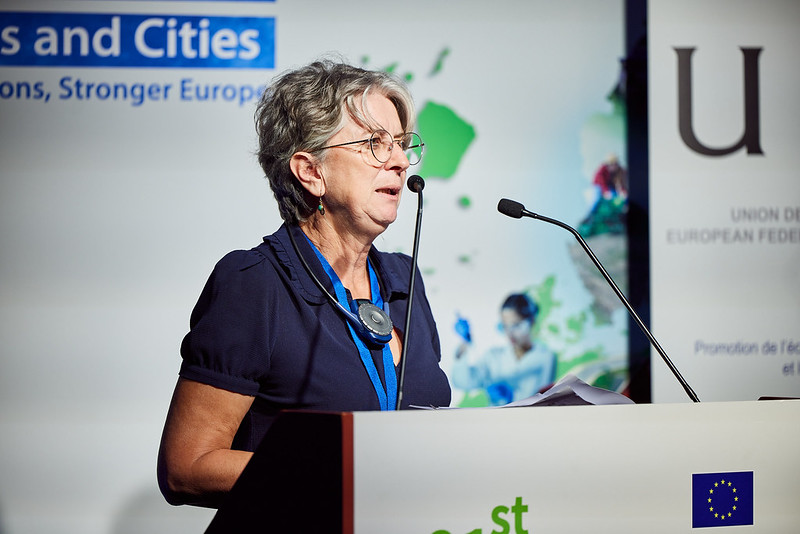
UDITE HOSTS SUCCESSFUL EU REGIONS WEEK WORKSHOP ON LOCAL ENERGY LOOPS
UDITE was delighted to host a high level workshop once again as part of the European Week of Regions and Cities in Brussels on 11th October 2023. The workshop, the first since the COVID-19 pandemic was hosted in the The Square Conference centre in Brussels. Under the banner of Local Energy Loops for Local Energy Needs, our high profile panel discussed why local energy loops are key to tacking high energy costs & are the basic building block for Europe to replicate best practices across the European Union and get the bloc back on track with its 20230 targets. At a time when local authorities are challenged by the high cost of energies that is creating real challenges for the provision of essential services to our citizens. Replicable local energy loops are the key the energy performance of our buildings and some of the case studies showed how local authorities can keep their swimming pools open, our streets safe and source heat recovery for social housing.
Our first speaker Xavier Boivert, DGS for Mordelles in Brittany and board member of SNDGCT, spoke of the importance of territorial partnerships between the public, private and voluntary sectors delivering territorial partnerships. Xavier went onto to set out the different loops that are vital to the function of the local authorities , their partnerships and the local population including those touch production and consumption patterns in the local territory. These include waste recycling, food waste, consumption behaviours and life style choices of the local population that can have a significant impact on the energy consumption of local communities. Xavier went on to describe how the challenge for local authorities in securing the benefits of local energy loops was reliant on their ability to bring all of the production and consumption patterns including industrial and residential together in a local ecosystems to quickly identify synergies and economies of scale for future action. Towards a strategy for stakeholder coordination that supports and facilitates private between different territorial stakeholders. To do this, local authorities need to set out a global framework for action, identify and help secure external finances that can leverage and accelerate action, set up and animate networks, communicate effectively to external actors and advise, support and convince new partners to get involved. To illustrate the point, Xavier cited the example of the Ile of Ouessant which has succeeded in generating over half of its energy needs from renewable tidal resources. Finally, with procurement playing an important role in the choice of services offered by small and medium sized municipalities Xavier flagged up the Territories of tomorrow initiative that has been setupo by UGAP the French national procurement agency that seeks to find a wide range of innovative service provision approaches that together make an important impact on the energy consumption and viability of local municipalities. READ MORE
Danielle Harvard, the SNDGCT coordinator for Brittany and Deputy Chief Executive of Mobihan Energies went on to outline the role of Local Loops in the South of the Brittany Region. ME is currently trialling new approaches at 14 sites across the Morbihan. Danielle introduced the concept of collective local consumption. This involves the ability of local stakeholders being able to share locally produced electricity using the existing public distribution network. All participants (producer and consumers) are connected to the low-voltage network with producer and consumers are brought together within the same legal structure with consumers retaining their usual electricity suppliers. Danielle underlined the importance of the European Union accompanying local energy agencies with their efforts and flagged up their latest project INTERREG NESSIE that will seek to tackle a key EU issue that of the shortage of next generation energy installers across the continent.
Read MORE
Closing the session Denis Bonvillain from VEOLIA spoke about three examples of local energy loops in Bulgarian, Romania and France. Sofia, reaching close to 100% self-sufficiency with an urban
wastewater treatment plant using solar renewable energy. In Romania, in a rural context, Pecs, is providing district heating thanks to a local biomass plant. Finally in Paris, Veolia has helped a local swimming pool complex In Paris, heat its swimming pool thanks to wastewater and a heat exchanger system. All of these examples are contributing to lowering the costs of waste waster treatment, district heating to social housing and helping local authorities manage the costs of swimming pools during a significant energy crisis. READ MORE
REWATCH VIDEOS AND DOWNLOAD SLIDES FOR EU REGIONS WEEK WORKSHOP